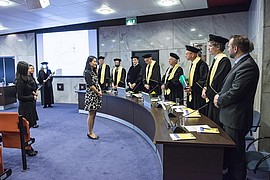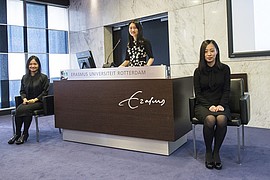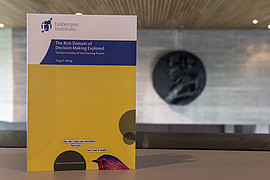PhD Defence: Tong Wang

In her dissertation ‘The rich domain of decision making explored: The non-triviality of the choosing process’ ERIM’s Tong V. Wang explores the rich domain of decision making.
Tong defended her dissertation in the Senate Hall at Erasmus University Rotterdam on Thursday, 26 May 2016 at 11:30. Her supervisor was Prof.dr. P.P. Wakker and her co-supervisor was Prof.dr. H. Bleichrodt. Other members of the Doctoral Committee were Prof.dr. A. Baillon (ESE), Prof.dr. A.J. Dur (ESE), and Prof.dr. M.J. Van den Assem (VU Amsterdam).
About Tong Wang

Tong V. Wang (1988) obtained double BSc degrees in 2010 on Financial Engineering and Applied Mathematics at the Renmin University of China, and an MPhil degree (cum laude) on Economics in 2012 at Tinbergen Institute and VU University Amsterdam. In 2012, she joined the Behavioral Economics Group at Erasmus University Rotterdam as a PhD candidate. This thesis reflects what she worked on during these three years to understand human decision making better. It also raises even more questions and serves as a starting point for her later research. Since November 2015, she is a research fellow at the Chinese University of Hong Kong, focusing on behavioral "anomalies" and thinking about rationality.
Thesis Abstract

This dissertation explores the rich domain of decision making. Chapters 2 uses data analysis on proprietary big datasets to empirically investigate what numbers players choose in lotteries, situations where all the options are constructed equivalently. Chapter 3 elicits subjects’ attitudes towards ambiguity in a laboratory experiment and investigates the effects of different sources of ambiguity. Chapter 4 reports the results of a field experiment, initially designed to increase students’ participation rates in teaching evaluations online by utilizing verbal nudges. Chapter 5 discusses decision frameworks other than Savage’s (1954) theoretically.
The empirical investigations all points to the non-trivial effects of the choosing process on decision making. The motivation and emotions of decision making leak into the decision made, and also may affect different populations in different ways. Further studies are needed to systematically answer the question of why and how these effects are there.
· View and download Tong' dissertation
Photos: Chris Gorzeman / Capital Images


